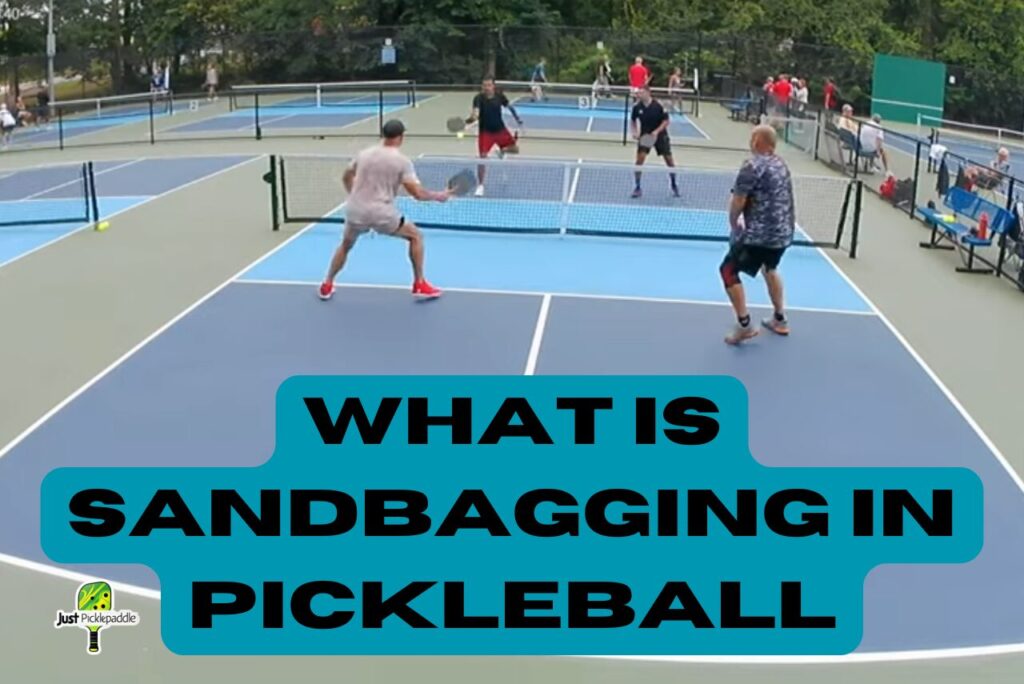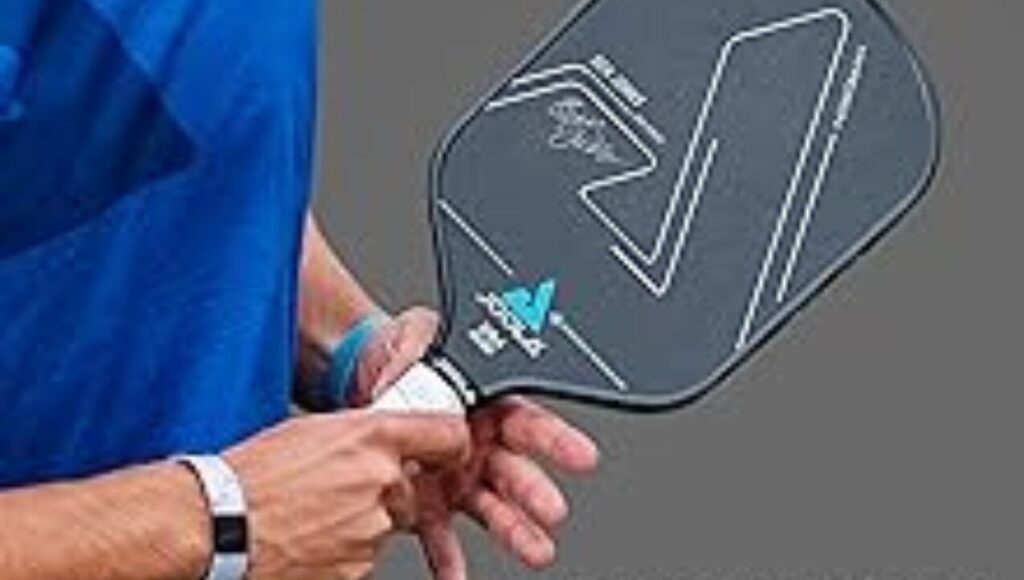What is Sandbagging in Pickleball?
“Sandbagging has a significant impact on the pickleball community.” It’s a dishonest practice that undermines fair competition and reduces the game’s enjoyment for many players.
While it’s challenging to eliminate, a combination of player awareness, stricter tournament regulations, and improved rating systems can significantly reduce its prevalence.
Intentionally concealing their true abilities, sandbaggers gain an unfair advantage over opponents who are playing honestly.
Table of Contents
What is Sandbagging
Sandbagging in pickleball is the dishonest practice of intentionally misrepresenting one’s skill level to compete in a lower skill bracket. This deceptive tactic gives players an unfair advantage over opponents who are playing honestly.
Similar to its historical meaning of a surprise attack with a sandbag, the term aptly describes the ambush nature of this dishonest strategy in the context of pickleball tournaments.
Have you ever wondered why some players seem exceptionally skilled for their level? Or perhaps you’ve experienced the frustration of losing to someone who appeared far superior to the bracket’s standard?
These could be signs of sandbagging. While unintentional skill disparities can occur, deliberate sandbagging undermines the integrity of the game and spoils the experience for other players.
This article aims to explore the causes, consequences, and potential solutions of sandbagging. Learn how to spot a sandbagger and how to avoid falling victim to their unfair practices.
Is Sandbagging Always Intentional?
Intentional Sandbagging
In its purest form, sandbagging is a deliberate act. Players knowingly misrepresent their skill level to gain an unfair advantage.
Unintentional Factors
While intentional sandbagging exists, several factors can contribute to players competing below their true ability without malicious intent:
- Regional Skill Disparities: Different geographic regions have varying levels of pickleball competition.
- Self-Assessment Challenges: New players often struggle to accurately assess their skill level.
- Rating System Inconsistencies: Discrepancies between different rating systems can lead to inaccurate placements.
What Do People Think About Sandbagging?
People have different ideas about sandbagging. Some people think it’s really bad when players cheat by pretending to be worse than they are to win easier games. They think it’s not fair to other players.
But other people understand that sometimes mistakes happen. Maybe someone isn’t sure how good they are, so they play in a lower group. Or, they might be nervous to play in a higher group. In these cases, people are usually okay with it.
However, if someone is good at the game but pretends to be bad just to win, that makes a lot of people angry. It’s like cheating in a big way.
The best thing to do is to play in a group where you have to try your hardest to win. That way, it’s more fun and fair for everyone.
How to Spot and Stop Pickleball Sandbaggers
If you think someone might be pretending to be worse than they are to win easier games, there are things you can do. First, pay attention to how they play. Are they really good for their level? Do they win too easily? You can also look up their past games to see if they’ve played at higher levels.
If you think someone is cheating, talk to the people running the tournament. They can check to see if the player is playing in the right group. It’s important to tell other players about cheating too, so everyone can work together to make the game fair for everyone.
How to Spot a Sandbagger
Superior Skill Level
A player who consistently performs significantly better than their peers in the bracket might be sandbagging.
Lack of Effort
A player who appears overly relaxed or disinterested during matches, even when facing challenges, could be intentionally holding back.
Proven Track Record
If a player has a history of success in higher-level tournaments, their presence in a lower bracket might be suspicious.
Player Rumors
Information shared among players about a particular individual’s playing ability can provide clues about potential sandbagging.
Why Do People Sandbag?
The Thrill of Easy Wins
Some players sandbag to experience the satisfaction of consistently winning matches without much effort.
Building Confidence
Players who lack confidence in their abilities might sandbag to play against weaker opponents and boost their self-esteem.
Balancing Partnerships
In doubles, particularly mixed doubles, a stronger player might sandbag to match their partner’s skill level and create a more even playing field.
Avoiding Tough Competition
Some players fear facing highly skilled opponents and may choose to play in lower divisions to avoid challenging matches.
Prioritizing Fun Over Competition
For some players, the social aspect of the game is more important than winning. They might sandbag to enjoy playing with friends without the pressure of competition.
How to Stop Sandbagging
Stricter Tournament Registration
For tournament organizers to prevent sandbaggers from entering lower divisions, player information should be carefully reviewed and possibly proof of skill level should be required.
Standardized Rating Systems
Using consistent rating systems like UTR or DUPR can help accurately place players and reduce sandbagging opportunities.
Player Reporting
Players should feel empowered to report suspected cases of sandbagging to tournament officials.
Promoting Fair Play
Encouraging good sportsmanship and educating players about the negative impacts of sandbagging can help create a culture of honesty.
Penalties for Sandbagging
Implementing clear consequences for sandbagging, such as disqualification or bans, can deter players from engaging in this unfair practice.
Tips to Avoid Being Sandbagged
Choose Sanctioned Tournaments
Sanctioned tournaments typically have stricter rules about player eligibility and use rating systems to place players in appropriate divisions. While not foolproof, they offer a better chance of avoiding sandbaggers.
Report Suspected Sandbaggers
If you believe a player is competing in the wrong division, inform tournament officials. Providing evidence like their playing history or online profiles can strengthen your case.
Understand Rating Systems
Familiarize yourself with different rating systems like DUPR and UTR. This knowledge can help you identify potential discrepancies in player placement.
Play with Trusted Partners
Partnering with players you know well can reduce the risk of encountering a sandbagger.
While these strategies can help, completely avoiding sandbaggers might be challenging. The key is to stay informed and support efforts to maintain fair competition in pickleball.
Final Thoughts on Sandbagging
Sandbagging is a frustrating issue that undermines the spirit of fair play in pickleball. While it’s a complex problem with no easy solution, a combination of player awareness, stricter tournament regulations, and improved rating systems can help curb this dishonest practice.
By working together, the pickleball community can create a more enjoyable and equitable environment for all players.
Ultimately, the success in combating sandbagging lies in the hands of both players and tournament organizers. By prioritizing fair play and sportsmanship, we can ensure that pickleball remains a fun and rewarding sport for everyone.
Frequently Ask Question
What is an example of sandbagging?
Sandbagging is a strategic tactic used to lower expectations. In business, it often involves companies underestimating their earnings potential to exceed targets and impress investors. This same principle applies to sports and games, where individuals might deliberately underperform to challenge opponents or gain an advantage.
What is the purpose of sandbagging?
Sandbagging is a strategic maneuver where individuals deliberately understate their capabilities or potential. By setting low expectations, they create a greater chance of exceeding them. In the corporate world, this often manifests as management providing earnings guidance below anticipated results, aiming to surprise investors positively.
Why do they call it sandbagging?
The term “sandbagging” originated in the late 1800s as a violent act involving a concealed weapon. Today, the term has evolved significantly, taking on a more strategic connotation in various fields, particularly in business.
What does sandbag mean in sports?
In sports, sandbagging refers to the unethical practice of intentionally underperforming to compete in a lower division or category. This allows an athlete to face weaker opponents, increasing their chances of winning and potentially achieving higher rankings or rewards. It’s a form of cheating that undermines the integrity of competition.



